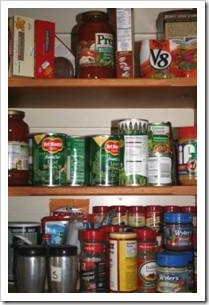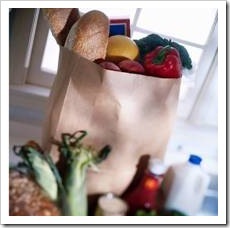 I grew up in a family that collected food. We joke about my mom that she has more food in her home now, living there only with my dad, than she did when she had all 5 of her kids living there too. If something happens, she could probably survive for about 2-3 years solely on the food she has at home.
I grew up in a family that collected food. We joke about my mom that she has more food in her home now, living there only with my dad, than she did when she had all 5 of her kids living there too. If something happens, she could probably survive for about 2-3 years solely on the food she has at home.
But as a family, I would not recommend doing that, because my mom has so many piles of food that she ends up throwing lots of it. Some of it expires and some of it is hidden so deep in her freezer that she finds it once a year during spring cleaning and must get rid of it.
My dad collects other things, but we can get to him some other time…
Anyway, as the daughter of such collectors, I had to struggle with this tendency to collect food. I have not fully recovered from it, but I did find some tricks to make things work better.
You see, my mom buys things without checking if she already has them in her cupboards and she always thinks she will run out of the things she needs for cooking, so she buys another one, “just in case”. It is funny she is a chef, but she cannot estimate how long it will take her to finish a bag of sugar, a packet of baking powder or a special spice.
Well, I thought about this and realized that we all have at home the food we use every day and must come up with a system to notify ourselves that we need to go and buy sugar or baking powder. After all, the reason we buy things is to use them and no one likes to start baking bread and discover there is no yeast. Ouch!
An obvious idea would be to go to the supermarket after checking what you have at home, instead of being an impulsive shopper, but it is not really possible to go over all your cupboards and check everything every time before you go shopping. So what can you do to solve this?
You can ask everyone in the family that when they use something and it is about to run out, they add it to the shopping list. This way, you can buy it the next time you go shopping. Simple, no?
 Yes, it works great, but the problem is never with the things you use on a regular basis. When you use something often, you already have a good idea how long it will take it to run out, so you can plan ahead. The problem is always with the products you buy in bulk and/or use rarely, so knowing exactly when they will run out is tough. For example, when you have a packet of icing sugar that you use roughly once a month and you are left with 150 grams, should you go and buy a new packet or wait until you only have 50 grams?
Yes, it works great, but the problem is never with the things you use on a regular basis. When you use something often, you already have a good idea how long it will take it to run out, so you can plan ahead. The problem is always with the products you buy in bulk and/or use rarely, so knowing exactly when they will run out is tough. For example, when you have a packet of icing sugar that you use roughly once a month and you are left with 150 grams, should you go and buy a new packet or wait until you only have 50 grams?
The solution for this is to take a permanent marker when you open the package for the first time and write the date of the first use.
You are probably asking, “Why?”
It is not because of the due date of the product, but more for you to get an idea of how long it took you to finish using the whole lot. For example, if I mark the first use date on my baking powder, after 2-3 packets I can tell that it takes me roughly 3 months to go through one, so when it is about to run out, I know I will need another one within 2 to 3 weeks.
I use corn syrup for my chocolate cake decorating. I cannot find this product easily at the regular supermarket and after going through 2 bottles, I realized I needed a bottle of corn syrup about once a year, so even if it is about to run out, I do not rush to buy another one, because I only use a small portion of it every time.
At one stage, using this method, I discovered that our consumption of salt had increased, because I was buying the family packs of salt more often. Without the date, I could not tell how long it had been sitting in my cupboard, but with the opening date, I could tell for sure we had been using more salt than usual (that also made me be more conscious about it and prompted me to fix it immediately).
You can do the same with every consumable: food items, laundry detergent, soap, shampoo, garden ingredients or even spa cleaning chemicals.
It worked for me. I hope it will work for you too.
Happy parenting,
Ronit
This post is part of the series Handy Family Tips:
- Make Your Bed to Make Your Day
- Handy Family Tips: Dishwasher
- Handy Family Tips: Pre-Marinating
- Handy Family Tips: Kitchen Scissors
- Handy Family Tips: First use date
- Handy Family Tips: Kids’ Artwork
- Handy Family Tips: Keys
- Handy Family Tips: Smelly bins
- Handy Family Tips: Treasure box
- Handy Family Tips: Glass jars
- Handy Family Tips: On time is late
- Handy Family Tip: Early is on time
- Handy Family Tips: Electric toothbrush
- Handy Family Tips: Make a Note
- Handy Family Tips: Laundry day
- Handy Family Tips: How to Peel Avocado
- Handy Family Tips: Bathroom Art
- Handy Family Tips: Easy Healthy Spread
- Handy Family Tips: Wake Up With a Smile
- Handy Family Tips: Color Coded Keys
- Handy Family Tips: Road Trip Games
- Handy Family Tips: How to Get Kids to Eat Vegetables
- Handy Family Tips: What to Do When There is No Shaving Cream?
- How to Control Your Kids’ Mobile Phone Use at Night











